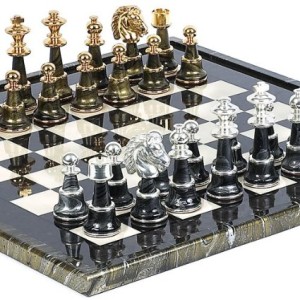7 Reasons Everyone Should Learn Chess: The Benefits of Learning Chess & More
There’s a reason chess is known as “the Game of King’s”, back a few hundred years ago, it was only the King’s and noblemen who played the game of chess. Why was that? Because chess takes a certain amount of skill, critical thinking, and foresight to be a great chess player. In today’s world, anyone can play chess, which also means everyone can benefit from learning and playing the game of chess.
7 Reasons Everyone Should Learn Chess: The Benefits of Learning Chess
1. It Teaches Critical Thinking
A lot of thinking is involved in the game of chess. For those first learning, it can also be overwhelming. This is why it’s always best to take the game one step at a time. However, regardless of whether you’re a beginner of chess, fairly experienced, or a chess master, the game involves a certain level of critical thinking.
In order to win at the game of chess, you have to be able to anticipate your opponent’s moves, keep track of all the chess pieces on the chess board, and manage to execute your own strategy to capture and checkmate your opponent’s King. (The good news, the more you play, some of the things you once had to concentrate greatly on become second nature.)
This critical thinking will translate well in the real world, as you will have a great deal of experience thinking critically, you will be able to use this same skill in many real life situations. I found personally after playing chess consistently for 6 months I was able to take on real world problems much more effectively with my newly enhanced developed critical thinking skills.
2. It Exercises Both Sides of the Brain: It Can Improve Creativity
In a German study, researchers showed both novice and expert chess players simple geometric shapes and chess positions and measured the chess players response times in identifying them. What was expected was the players left brain, the side responsible for critical and logical thinking, to be much more active, but that the right hemisphere of the brain (the side more involved with creative thinking) would not be as active.
What they found that was not expected was the expert chess players were using both sides of the brain to respond more quickly to the chess related questions, implying that experienced and expert chess players use both sides of the brain, implying that chess can improve your creativity
My good friend Sean, who claims he is never the creative type, found himself much more creative after playing chess consecutively for a year. He went from a very typical logical person, to embracing a more creative side. He accredited this to his chess playing.
3. It Helps Prevents Alzheimer’s
For the past decade, neuroscience has shown time and time again that the brain works similar to a muscle, in that in order to keep it healthy, it must stay active.
A recent study featured in The New England Journal of Medicine found that people over 75 who engage in brain-stretching activities, such as chess, are less likely to develop dementia than their non-board-game-playing peers. Just like an un-exercised muscle loses strength, Dr. Robert Freidland, the study’s author, found that unused brain tissue leads to a loss of brain power. Another article on this can be read here.
Keep your brain powered and healthy and make sure to get your daily dose of chess.
4. It Improves Your Memory
As discussed in the point above, your brain is like a muscle. This means when you play chess, you “work out” and develop the areas it uses. One of these is your memory. Aside from the fact that you have to remember how to use and move all the chess pieces correctly (which for beginner’s can sometimes be fairly time-consuming to learn alone), you also have to remember certain chess strategies, how moving one chess piece may affect a future move, and much more.
As a result, an additional benefit of learning chess is you’ll find yourself with a much more crystal clear memory.
5. It Improves Concentration
Chess takes a lot of concentration. Generally speaking, you’re not going to win chess with a 2 move checkmate, 3 move checkmate, or 4 move checkmate. The game of chess is usually going to take time. This means another benefit of learning chess is you’ll have a tremendously higher level of concentration.
Taking your focus off the game of chess for just a few moments can cost you the game against even just a fairly experienced opponent. You have to concentrate on your own chess pieces, your opponent’s, and anticipate how some chess moves may alter the game for future moves…and this is something you have to concentrate on all at once.
The good thing about this is though, when you’re not playing chess, you’ll have the concentration of a Jedi in the real world.
6. It Can Help with Your Career
This may not apply to everyone, but as covered in all the other points, the benefits of learning chess translate to benefits in the real world. It doesn’t matter what job you may have, increased ability in memory, concentration, and critical thinking can be beneficial to just about everyone. This also applies if are in college or another form of higher education (as well as younger students as well.)
Also, if you own a business or have your own office, it also looks good to have a chess board in the room. Even if it’s never used, people assume it means you’re smart and an effective critical thinker. (Of course, another benefit of learning chess in this case would be if someone ever challenges you to a game, you actually can play decently well.)
7. It Teaches You How to Plan Ahead & Develop Foresight
The most critical aspect of being a great chess player is anticipation and foresight. If you just move your chess pieces without taking into account on whether or not they may be captured, or what moves that will open up for your chess opponent, you’ll find your chess pieces captured fairly quickly, along with your King.
In order to master the game of chess, it involves being able to plan ahead, and having the foresight to understand how one chess move may result in not just the next move, but even 3, 4, 5 or more moves ahead. In order to develop this, it takes time and practice as your skill level develops, but like all these other benefits of chess, this will also translate well into the real world.
Improve Your Chess Game:
Learn Chess 101: Learn How to Play Chess, the Rules of Chess & Basic Chess Strategy
How to Correctly Set Up the Chessboard
How to Move the Chess Pieces Correctly
Learn How to Win Chess in 2 Moves (Fool’s Mate/2 Move Checkmate)
Learn How to Win Chess in 3 Moves(3 Move Checkmate)
Learn How to Win Chess in 4 Moves (Scholar’s Mate/4 Move Checkmate)
Learn How to Castle in Chess







